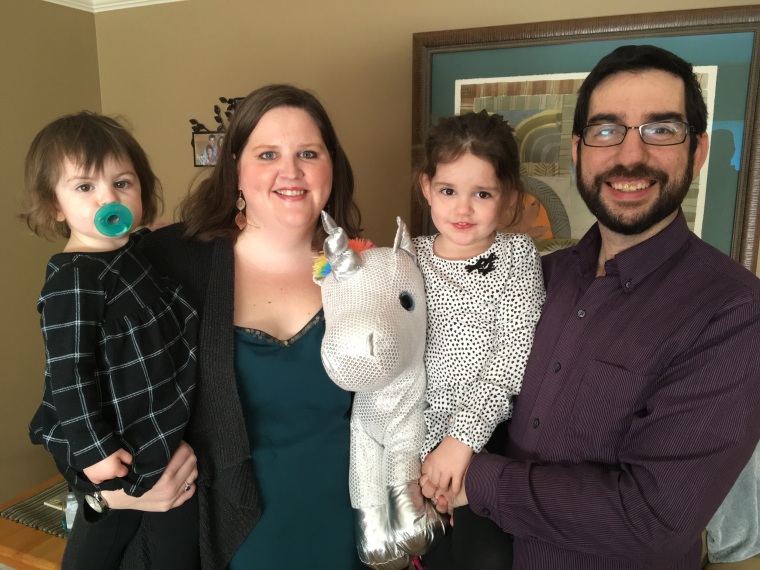The intrusive thoughts started weeks after Stephanie Hathaway gave birth: an overwhelming feeling that her daughter deserved a better mother; that her husband deserved a better wife; that her future was hopeless.
“They just played on repeat in my head,” Hathaway, 33, of South Glastonbury, Connecticut, said. “I was holding my baby one night, and my husband was at a meeting, and I just thought, ‘Oh, my goodness. If I put the baby down, I might hurt myself.’”
Hathaway was diagnosed with postpartum depression — the intense sadness, anxiety or despair that occurs within the first year after giving birth, according to the Centers for Disease Control and Prevention. It affects about one in nine women, although the rate may be as high as one in every five women, the CDC finds.
Hathaway’s doctor put her on antidepressants, which helped some, but it took two weeks for the medication to kick in, and even longer until her doctor found the appropriate dosage for her. As she waited for relief, Hathaway found herself struggling to bond with her newborn, Hadley, who is now 4.
“It’s heartbreaking,” Hathaway, who had never suffered from depression before and is now a mother to two girls, said. “That’s not what I expected to feel.”
Up until this point, new mothers experiencing postpartum depression have been prescribed the same antidepressants used for treating depression in the general population, such as selective serotonin reuptake inhibitors. The drugs can take weeks to take effect, and do not address the hormonal changes that women go through during and after pregnancy.
But on Tuesday, the Food and Drug Administration approved the first drug specifically developed for postpartum depression, called brexanolone, or Zulresso.
Brexanolone is novel because it has a synthetic form of the hormone allopregnanolone, a progesterone derivative, in it. The hormone increases throughout a woman’s pregnancy and then plummets after she gives birth, a possible contributor to postpartum depression.
“It’s not just the mother who suffers when there’s postpartum depression. It’s the newborn. It’s the other people in their family.”
“This can potentially transform women’s lives and that of their families,” said Dr. Steve Kanes, chief medical officer of Sage Therapeutics, the Cambridge, Mass., biopharmaceutical company that developed brexanolone. “It’s not just the mother who suffers when there’s postpartum depression. It’s the newborn. It’s the other people in their family.”
Brexanolone is not a pill. The drug is delivered intravenously over the course of a 60-hour infusion, meaning it must be administered in a medically supervised setting, such as a skilled facility or a hospital, rather than at patients’ homes.
Improvement in just 24 hours
Clinical trials for the drug were promising — not just in the number of women it helped, but in the near-instantaneous relief that is provided.
In double-blind, placebo-controlled trials, many women with moderate to severe postpartum depression saw a marked improvement of their symptoms within just 24 hours of receiving the drug. That improvement was still present 30 days after the infusion, the length of the trial.
“This is for postpartum depression, but it is a step in understanding how we treat depression more broadly,” said Dr. Samantha Meltzer-Brody, director of the perinatal psychiatry program at the University of North Carolina at Chapel Hill and the academic principal investigator in the brexanolone trials. “We have had the same treatments for depression for 30 years. There’s an enormous need for new, novel ways to treat depression, and to treat it quickly.”
The drug’s approval comes just weeks after the FDA signed off on esketamine, a fast-acting nasal spray that uses the active ingredients in the club drug ketamine, as a treatment for severe depression.
For patients who are depressed, rapid relief is a priority. Hathaway, the Connecticut mother, was again diagnosed with postpartum depression after she gave birth to her second, a girl named Brenley who is now 2. This time, the antidepressants did not help at all, and Hathaway felt herself slipping deeper and deeper into a state of hopelessness.

She participated in a brexanolone trial, and her response was striking. Between hours 12 and 18 of the 60-hour infusion, she noticed her despair had waned.
“I woke up from a nap, and the thoughts were gone. And they never came back,” Hathaway said. “And then hour after hour, I got my energy back. I got my appetite back. I was eating because I was actually hungry, not because people were making me eat.”
A common condition
Postpartum depression afflicts as many as 400,000 women in the United States each year. It can include disturbances in sleep or eating patterns in addition to feelings of sadness or apathy. Affected women are often confused and guilt-ridden about why they are feeling down during what is supposed to be a happy time, said Dr. Christine C. Greves, an obstetrician-gynecologist at Orlando Health Winnie Palmer Hospital for Women and Babies.
"It’s all fantasy until we actually have the baby. And then you do feel guilty, because we all want to be Super Mom.”
“As women, we feel like we were born to have a child, and there’s a white picket fence, and life will be great,” said Greves, who does not have ties to Sage Therapeutics. “Then regular life comes into play. You have a child and then you top that with extensive fatigue, hormones, expectations that just can’t be met. It’s all fantasy until we actually have the baby. And then you do feel guilty, because we all want to be Super Mom.”
In the past decade, experts say, there has been more awareness about postpartum depression and more efforts among obstetricians and pediatricians to screen mothers for it.
But having a drug specifically aimed at treating postpartum depression will be one of the most significant steps toward removing any stigma still associated with the condition, said Dr. Kimberly Yonkers, professor of psychiatry, epidemiology and obstetrics, gynecology and reproductive sciences at the Yale School of Medicine.
“It does women a service because it really brings attention to a major medical problem and provides legitimacy, and hopefully will encourage people, whether they use this medication or not, to seek and obtain treatment,” said Yonkers, who does not have ties to the drug company. “We’re all thrilled about that.”
Some side effects, and a hefty price tag
The most common side effects during the brexanolone trial were drowsiness and dizziness. The drug is not believed to have any long-term safety concerns. Kanes, Sage Therapeutics’ chief medical officer, said he expects it will be deemed safe for all mothers, including breastfeeding mothers, but the company is waiting for an FDA ruling on breastfeeding.
The drug comes with a hefty price tag: Sage says it is expected to cost somewhere between $20,000 to $35,000 for the infusion. That does not include the price of a stay in whatever facility it is administered in. It is not clear yet how much insurance would cover.
Kanes pointed out that while high, the cost is a one-time price.
“That’s such an important piece as to why this is so novel. We’re talking about a single treatment that has durable effects,” he said. “This really is a one-time intervention that gets people on their way. It’s transformative.”

For Hathaway, the brexanolone infusion enabled her to return home and be the mother to her daughters that she had wanted to be before postpartum depression took over.
“It’s given them their mom back,” she said. “This is what it was supposed to be like.”


